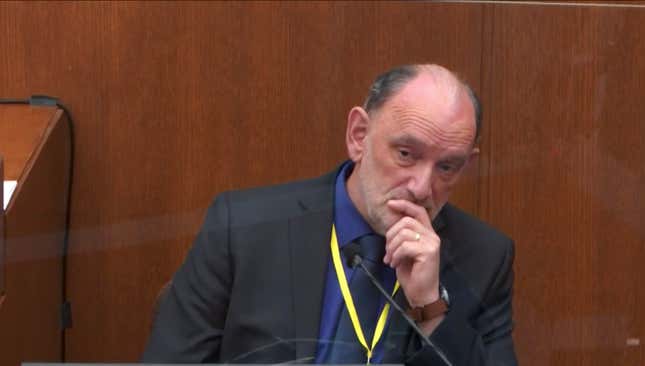
Throughout the trial, Derek Chauvin’s defense team has largely argued that the Chauvin used “reasonable” force against George Floyd, and Floyd’s drug use and pre-existing health conditions were responsible for his death. Day 13 of the trial saw the defense bring a medical expert to the stand to make the case that Floyd died from a litany of factors; none of which were the knee placed on his neck and back for over 9 minutes.
According to CNN, the day began with Judge Peter Cahill denying a motion submitted by defense attorney Eric Nelson to acquit Chauvin. Cahill also ruled that Morries Hall, a friend of Floyd’s who was in the car the day he died, would not take the stand. Hall has been seen in some of the body camera footage captured at the scene, and the defense had subpoenaed Hall for his testimony. An attorney for Hall argued that any testimony he gave would likely be self-incriminating. Cahill agreed, saying that Hall had “a complete fifth amendment privilege here.”
The defense only called one witness to the stand today in Dr. David Fowler; a retired forensic pathologist. He was brought on by the defense as a medical expert and testified that he believed Floyd’s death was caused by “sudden cardiac arrhythmia.” He essentially argued that it was literally every factor (drug use, Floyd’s history of hypertension, the exhaust from the police cruiser), but Chauvin’s actions that caused Floyd’s death.
“You put all of those together, it’s very difficult to say which of those is the most accurate,” he testified.
The New York Times reports that Fowler also argued that Floyd being laid in the prone position wasn’t inherently harmful, even though multiple experts testified last week that the prone position could result in “positional asphyxia.”
During its case the prosecution called nearly 40 expert witnesses, most of whom did a solid job explaining their arguments in a detailed and engaging way. For example, Pulmonologist Dr. Martin Tobin did a great job breaking down on a physiological level how the actions of the officers contributed to Floyd suffocating. He made an argument and thoroughly backed it up.
Fowler, on the other hand, didn’t really specialize in any one area, and a few of his assertions were undercut upon cross-examination. He testified that he believed carbon monoxide was a factor in Floyd’s death, but when asked by prosecutor Jerry Blackwell if it was true he had not “seen any data, or test results, that showed Mr. Floyd had a single injury from carbon monoxide,” he responded, “Yes, true.”
Which begs the question: why did he even bring it up as a factor if there was no data to support it? Blackwell also got Fowler to testify he believed the officers should’ve begun giving Floyd medical attention the moment they realized he didn’t have a pulse.
The defense is expected to rest its case tomorrow, with closing arguments being heard on Monday. We’re nearing the end of Derek Chauvin’s trial, and it comes as Minneapolis is dealing with yet another Black man’s death at the hands of police.

